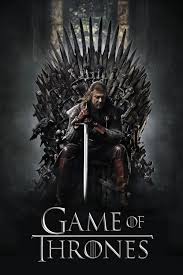The Game Of Thrones, the critically acclaimed television series based on George R.R. Martin’s series of fantasy novels “A Song of Ice and Fire,” captivated audiences worldwide from its debut in 2011 until its conclusion in 2019. Known for its intricate plotlines, complex characters, and shocking twists, the series became a cultural phenomenon that left a lasting impact on television and popular culture. This article explores the origins, key themes, and enduring legacy of “Game of Thrones.”
Origins and Development
The roots of “Game of Thrones” trace back to the late 1990s when George R.R. Martin began writing his epic fantasy series. The first book, “A Game of Thrones,” was published in 1996 and garnered a dedicated readership. In 2007, HBO secured the rights to adapt the series into a television show, with David Benioff and D.B. Weiss at the helm as showrunners. The show’s first season premiered in April 2011, quickly drawing in viewers with its gritty realism, political intrigue, and moral ambiguity.
Plot Overview
Set in the fictional continents of Westeros and Essos, “Game of Thrones” weaves together numerous storylines centered around noble families vying for power and control of the Iron Throne. The series features a large ensemble cast, including notable characters such as:
- Eddard Stark: The honorable head of House Stark, whose moral integrity drives much of the early narrative.
- Daenerys Targaryen: The last surviving member of a deposed royal family, determined to reclaim her birthright.
- Tyrion Lannister: A witty and intelligent dwarf navigating the treacherous political landscape of Westeros.
- Jon Snow: The illegitimate son of Eddard Stark, who seeks his place in a world filled with conflict and danger.
The series masterfully intertwines themes of loyalty, betrayal, honor, and the consequences of power, often blurring the lines between heroes and villains.
Key Themes
- Power and Ambition: At its core, “Game of Thrones” explores the nature of power and the lengths to which individuals will go to attain it. The quest for the Iron Throne drives much of the plot, revealing the corrupting influence of power on relationships and morality.
- Moral Ambiguity: The series challenges traditional notions of good and evil. Characters often face complex moral dilemmas, forcing viewers to grapple with the consequences of their choices.
- Gender Dynamics: The portrayal of strong female characters, such as Daenerys and Cersei Lannister, adds depth to the narrative. Their struggles for power and recognition highlight the challenges women face in a patriarchal society.
- Family and Loyalty: Familial ties are a recurring theme, with loyalty often tested in the face of ambition and betrayal. The importance of honor and duty to one’s family drives many characters’ actions.
Cultural Impact
“Game of Thrones” became a cultural touchstone, generating a devoted fanbase and influencing the landscape of modern television:
- Viewing Experience: The show popularized the phenomenon of “event television,” where viewers gathered to watch episodes as they aired, leading to widespread discussions and fan theories.
- Merchandising and Spin-Offs: The series spawned a vast array of merchandise, from action figures to clothing. HBO is also expanding the franchise with prequels, including “House of the Dragon,” which delves into the history of House Targaryen.
- Critical Acclaim: The series received numerous awards, including multiple Emmy Awards, solidifying its place in television history. It was praised for its production values, storytelling, and character development.
Controversial Conclusion
The final season of “Game of Thrones” faced criticism for its pacing and character arcs, leading to polarized opinions among fans. Many felt that the resolution of certain storylines did not align with the show’s earlier depth and complexity. Despite the mixed reviews, the series remains a significant part of popular culture and continues to spark discussions about its legacy.
Conclusion
“Game of Thrones” transformed the television landscape, combining epic storytelling with rich character development and complex themes. Its impact on popular culture is undeniable, influencing how fantasy narratives are portrayed in media. While the series concluded, its legacy lives on through discussions, fan communities, and the anticipation of future stories set in its richly crafted universe. Whether you are a die-hard fan or a casual viewer, “Game of Thrones” offers a captivating exploration of power, morality, and the human experience.




